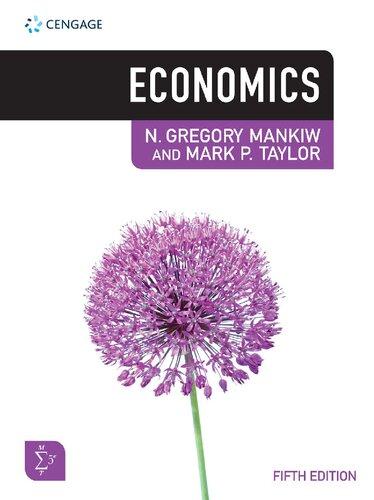One of the biggest threats to the stability of a currency union is asymmetric shocks. As we
Question:
One of the biggest threats to the stability of a currency union is asymmetric shocks. As we have seen in this chapter, a shock to one economy which results in recession and rising unemployment can cause tensions within the currency union as central bank policy becomes less flexible in managing the different economic problems within the union.
The existence of countries with different economic problems and the effects of the Financial Crisis in the EU has prompted the European Commission to explore ways in which fiscal stabilizers can be used across the EU to help support EMU. One suggestion that has been put forward is a common European unemployment benefit scheme. Two models have been explored; one would guarantee employees across euro zone countries a minimum benefit in the event of unemployment via a common European insurance scheme.
The second would see funds transferred to national budgets in member states which were experiencing high levels of unemployment due to an asymmetric shock. Olaf Scholz, the Vice Chancellor of Germany and the German Finance Minister, has proposed a solution that would require each member state to ensure that it guarantees a minimum unemployment benefit to help support employees in the event of losing their jobs and provide an automatic stabilizer.
If the member state suffered an asymmetric shock, it could apply for a loan from a ‘reinsurance scheme’ to help maintain unemployment benefits. These loans would have to be repaid after the effects of the shock have worn off.
To finance these schemes, each country would contribute to a European fund which would provide a minimum income to those experiencing short-term unemployment. This would have the added effect of improving macroeconomic convergence and integrate member states’ labour markets. The European Commission published a paper in 2017 on the proposals which noted that, ‘a “European Unemployment Reinsurance Scheme” may provide “breathing space” for national public finances and help to emerge from the crisis “faster and stronger”’.
In an interview with German news service Welt Am Sonntag (World on Sunday), the EU President made the following comment on the idea of a European Insurance Scheme:
Even though I am very much in favour of a European unemployment insurance, this must not be a ‘carte blanche’ for countries that do not carry out reforms and find themselves in difficulties as a result. In our proposal for the medium-term financial planning, the Commission put forward two instruments: 25 billion euro for a reform support programme and 30 billion euro for a stabilisation function, a shock-absorption mechanism to cope with asymmetrical, external shocks – this can also include a re-insurance for national unemployment insurance schemes. This instrument could help to mitigate sudden economic crises in a particular country caused by external developments, and thus provide re-insurance at European level for national insurance systems. It is not right that a particular EU country has to reduce unemployment benefits because of rising jobless numbers in a crisis that is not of its making. It is important not to respond to crises with the wrong type of spending cuts, lowering investments, education spending and unemployment benefits
Critical Thinking Questions
1 Why are asymmetric shocks a threat to currency unions like EMU?
2 A European unemployment insurance scheme would effectively mean that funds would need to be transferred from nations not experiencing the effects of shock to those that are experiencing high unemployment. Use an AD/AS model to show how this might affect the price level and national income in the two countries.
3 A common European insurance scheme would necessitate risk being shared across all member states. To what extent might it be politically difficult to get such a scheme passed in the EU?
4 How would a common unemployment insurance scheme ‘improve macroeconomic convergence and integrate member states’ labour markets’?
5 Critically assess the comments by Jean-Claude Juncker that any scheme is not a ‘carte blanche for countries that do not carry out reforms’ and that countries should ‘not respond to crises with the wrong type of spending cuts, lowering investments, education spending and unemployment benefits’.
Step by Step Answer:






